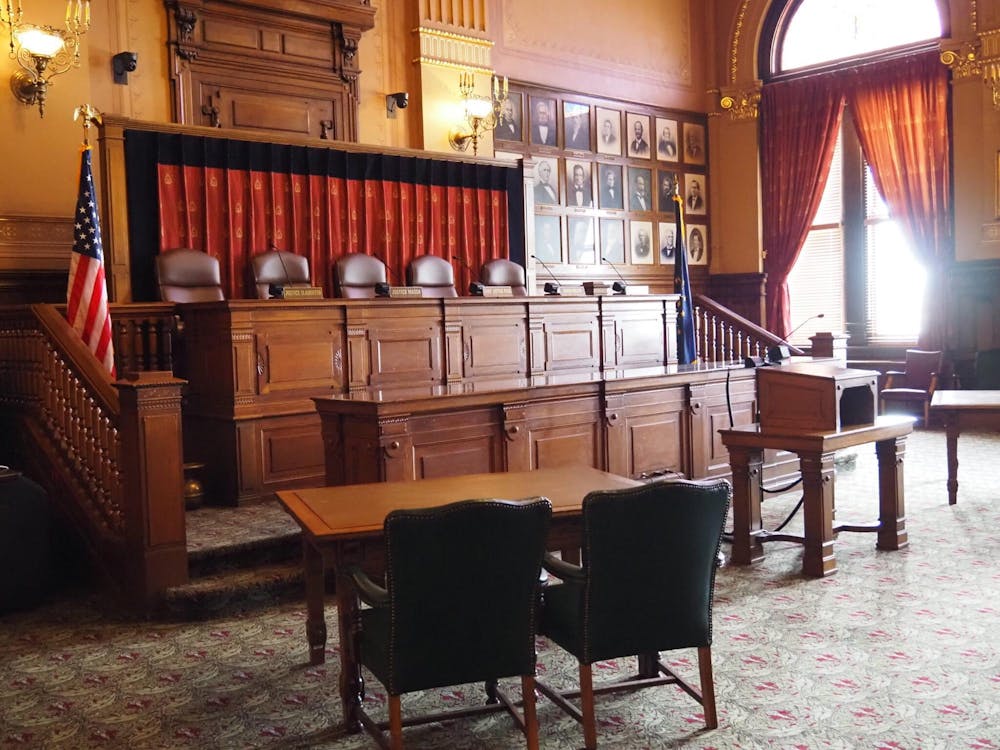The Indiana Supreme Court is considering how to balance the discovery of cell phone information with privacy rights following a hearing Thursday where a car accident victim wanted access to phone data of the driver who struck him.
The victim, Charles Jennings, argued a lower trial court abused its discretion when prohibiting him from inspecting the phone data.
During Thursday’s oral argument, a lawyer for Jennings said the exclusion of the requested evidence could have contradicted the driver’s deposition and impacted the outcome of a jury trial. Jennings sought phone data showing whether the person driving was using the navigation application “Waze” during the accident.
“If this jury knew that she was lying about having Waze on, at the end of the day they would say ‘okay we don’t trust her,’” said Bryan Babb.
However, a lawyer for the driver, Jessica Smiley, said allowing the man to access her unlocked phone posed overwhelming privacy concerns.
“A smartphone contains far more information than a personal diary,” said Bob Durham.
Background of the case
Smiley was driving in Carmel in December 2019 when she struck Jennings, who was walking across the street at the time of the accident. According to an Indiana Court of Appeals opinion, Jennings had stepped into the street from behind a box truck, which had blocked Smiley’s view of him. Jennings sued Smiley in February 2020, arguing she had been “negligent” while driving. In her answer to Jennings’ complaint, Smiley claimed Jennings had been “contributorily negligent.”
A year later, Jennings moved to compel discovery of Smiley’s cellphone data, seeking to find out if she was using Waze at the time of the accident. Smiley had previously said in a deposition that she had been using the app when she started her drive, but was not using it during the accident.
Although the trial court initially granted Jennings’ motion, Smiley asked the court to reconsider due to privacy concerns. In September 2021 the trial court overrode its prior decision and denied the motion to compel.
In January 2023 a jury found Jennings had been 90% at fault and Smiley had been 10% at fault for the accident after experts testified Jennings had not crossed at an intersection or crosswalk, and that there was limited evidence Smiley was distracted or driving recklessly. The trial court ruled in Smiley’s favor and the Indiana Court of Appeals affirmed that decision.
Balancing discovery and privacy
During Thursday’s hearing, Babb argued the trial court’s decision to deny the requested discovery constituted a reversible error. He said if his client finds data showing Smiley was using the navigation app at the time of the accident, the jury’s judgment should be reversed and vacated.
Babb said Jennings needed access to Smiley’s phone to see if she was using the application within an hour of the accident. If they found Waze was running, Babb asserted they could then investigate further to find out if Smiley was interacting with the app — which allows users to tap on their screens to report traffic delays and accidents. Since Smiley said in her deposition she wasn’t using the app, just that she had checked the app before starting her drive, Babb said contradicting data would prove she was “a liar” — something he believes would influence a jury’s decision.
However, Indiana Supreme Court Justice Geoffrey Slaughter said Jennings could have gotten that same information without accessing the phone, such as by contacting Waze to obtain the user data.
“It’s not obvious to me you couldn’t have gotten it from an alternative source,” Slaughter said.
Additionally, Durham, Smiley’s attorney, said the characterization of his client was not central to the case.
“The question for the jury was ‘was she negligent?’ not ‘is she a liar?’” Durham told the court.
The justices asked both parties’ attorneys about the privacy implications of allowing cell phone discovery in civil cases. Durham said that even if the other party was only looking for the hour of Waze data, there are no safeguards to prevent them from accessing texts, emails and other personal information.
“Discovery in its very nature is intrusive,” Justice Derek Molter said in response to Durham.
The court will issue a decision in the coming months.





The Daily News welcomes thoughtful discussion on all of our stories, but please keep comments civil and on-topic. Read our full guidelines here.